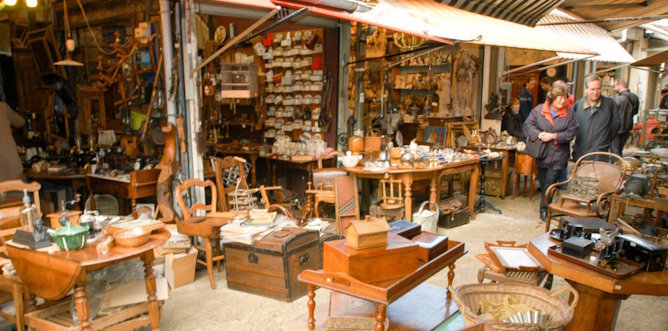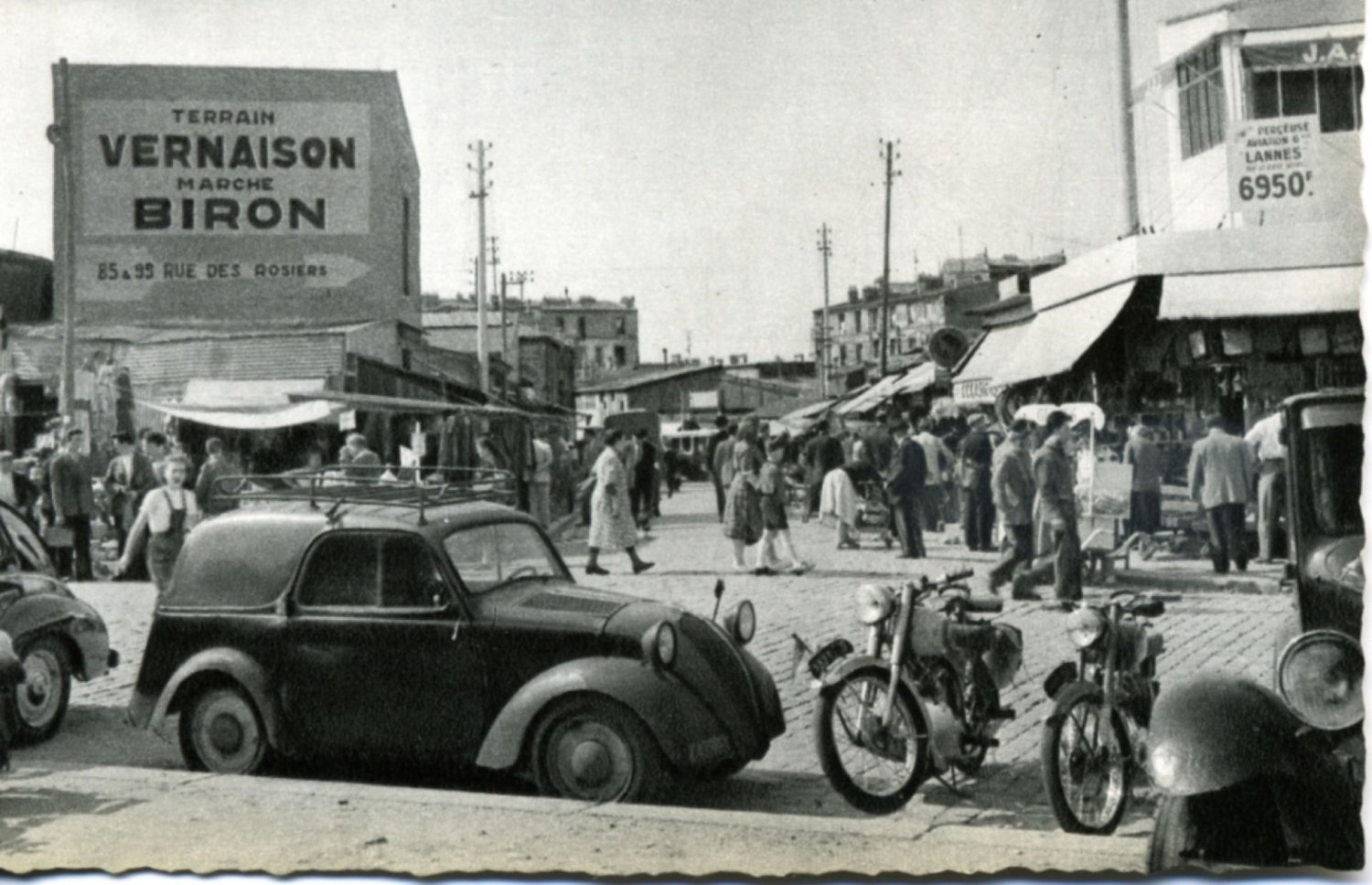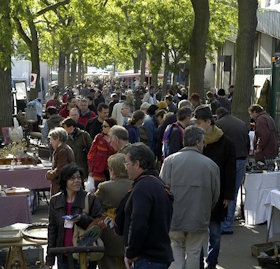Paris Flea Market. Hours. Map. Metro

Paris Flea Market in Saint-Ouen is one of the most picturesque shopping venues of the city. Take pictures, buy souvenirs, find something unique. You can easily spend there half a day. Paris markets. Shopping in Paris.
Paris Flea Market facts
Operating since 1885, the famous Paris Flea Market (Le Marché aux Puces) extends over six hectares in Saint-Ouen, a city bordering Paris.
It attracts 70 000 shoppers every week to its 1000 traders for fashion, handicrafts, used clothes and 2500 merchants for antiques.
In the 1950ies and 1960ies, great antiques could be bought at bargain prices in Paris Flea Market. This is rarely the case anymore. The Flea Market remains a fascinating shopping venue to visit. Choice is plenty, allowing you to buy something unique. Prices are moderate to high.
The picturesque Flea Market is a true Parisian shopping experience.
Saint-Ouen 93400 France

Each Flea Market shop is fascinating
Paris Flea Market hours
The Paris Flea Market is open from 8 a.m to 12 a.m on Fridays, 10 a.m to 6 p.m on Saturdays and Sundays, 11 a.m to 5 p.m on Mondays (fewer shops open).
Paris printable Flea Market map
Paris Flea Market maps
The Flea Market is composed of 14 separate markets (Marchés) with their own atmosphere and good assortment, all within walking distance. Use the map below to visit them all.
Download Printable Paris Flea Market map pdf with detailed information and history of Flea Market
Locate the Flea Market on the map.
Paris Flea Market metro stop
Metro: Garibaldi station, line 13. 15' walk to the Flea Market.

Paris Flea Market is famous
The 11 covered markets of Paris Flea Market
Saint-Ouen has 11 specialized covered markets open to the general public, each with its own atmosphere.
Saint-Ouen 93400 France
Saint-Ouen 93400 France
Saint-Ouen 93400 France
Saint-Ouen 93400 France
Saint-Ouen 93400 France
Saint-Ouen 93400 France
Saint-Ouen 93400 France
Saint-Ouen 93400 France
Saint-Ouen 93400 France
Saint-Ouen 93400 France
Saint-Ouen 93400 France
Paris Flea Market detailed facts
The Paris Flea Market is the largest concentration of antique dealers and second-hand dealers in the world, totaling more than 5 million visitors per year, including many foreign tourists and even very often celebrities.
Fifth tourist site in France located at a northern door in Paris in front of the 18th arrondissement, it is held every Saturday, Sundays and Mondays.
Seven hectares form the entire flea market, which is to date consisting of twelve covered markets open to the public (Antica, Biron, Cambo, Dauphine, L’Entrepôt, Jules-Vallès, Malassis, Le Passage, Paul Bert and Serpette and Vernison), five Childcare Shops (rue Jules Vallès, rue Lecuyer, rue Paul Bert, rue des Rosiers and rose. Simon) and merchant unpacking on the sidewalks, with each and everyone a clean identity, forming a picturesque and friendly set.
It is an original experience of popular Paris, a walk rich in surprises and a gold mine for lovers of vintage parts or antiques.
Paris Flea Market detailed history
After the Franco-Prussian war of 1870, the rag-and-bone men who had been ousted from Paris built the first merchant villages in Saint-Ouen. These wandering scavengers were nicknamed “bone pickers”, “rag grabbers” and “street grubbers”, and also, more poetically, “moonlight sinners” as they would roam through towns at night looking for discarded items or rubbish that they went on to sell at the markets.
The year 1885 saw the official opening of the Paris flea market. The town of Saint-Ouen rallied together to cleanse and secure the area. The merchants wishing to sell their wares there had to pay for the right to do business there. Newspapers published complimentary reports about the market between 1905 and 1914. More and more Parisians would come here on Sundays, in keeping with their tradition of going for a walk outside the city walls.
After WWI, the Flea Market became so popular that businessmen bought up the land surrounding the rue des Rosiers. They built streets and connected certain stalls with the water and electricity networks and sold these spots at a very high price. This is how the first four markets were established between 1920 and 1938. They were the Marché Vernaison, the Marché Malik, the Marché Biron and the Marché Jules Vallès.

From that time on, the flea market became a very fashionable place, famous for its cafés, bistros, restaurants and entertaining activities. At the time, the many bistros in the area were very popular with the new working population of Saint-Ouen. This community started to mix with that of the gypsies who were also living here in caravans. The gypsies brought life to the town with their music, the Gypsy Jazz. The famous Django Reinhardt was known to have played at Les Puces, as well as in many open-air cafés from here to Montmartre.
Between 1946 and 1991, 12 other markets were set up for trading.
Paris Flea Market left bank
The city has a second Flea Market at Porte de Vanves in the left bank of the Seine River. Located in a no tourist area, this Flea Market is smaller and totally outdoor.
Paris 75014 France
The Paris Flea Market left bank is open Saturday and Sunday from 7am to 2pm all year round.
Locate Paris flea market left bank on Paris map.
Paris metro: Porte de Vanves station, line 13

Porte de Vanves flea market is in left bank
